A Conversation With Stephen Coonts
by Claire E. White
Stephen Coonts is the author of eight New York Times bestselling novels, the first of which was the classic flying tale, Flight of the Intruder. Born in 1946, Stephen Paul Coonts grew up in Buckhannon, West Virginia, a coal-mining town of 6,000 people on the
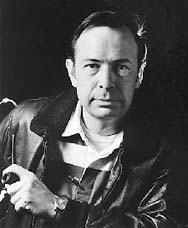
|
He received his law degree in December, 1979, and moved to West Virginia to practice. He returned to Colorado in 1981 as a staff attorney specializing in oil and gas law for a large independent oil company. When his firm downsized, he realized that he had never really liked the practice of law, and decided to try his hand at writing a novel. Thirty-five publishers rejected his first novel, which was eventually published by the Naval Institute Press, which had just hit a home run with Tom Clancy's The Hunt for Red October. The novel, Flight of the Intruder spent 28 weeks on the New York Times bestseller list in hardcover. A motion picture based on this novel, with the same title, was released nationwide in January, 1991. Flight of the Intruder was followed by Final Flight, The Minotaur (Doubleday, 1989), Under Siege (Pocket Books, 1990), a New York Times Notable Book, The Cannibal Queen, (Pocket Books, 1992), The Red Horseman, (Pocket Books, 1993), and The Intruders (Pocket Books, 1994). These six novels were bestsellers, both in the U.S. and overseas.
The Cannibal Queen, his nonfiction work, chronicles his journey with his son one summer as they traveled across the USA in a Stearman biplane. For his legions of fans, this is the ultimate book about the love of flying. He recently collected and edited an anthology of true flying stores, War in the Air, which was published by Pocket Books in 1996. His seventh novel, entitled Fortunes of War, was published in May, 1998, by St. Martin's Press.
His eighth novel, Cuba, hit the bookstores in August, 1999, and immediately hit the bestseller lists and garnered rave reviews.
A member of the Board of Trustees of West Virginia Wesleyan College, Coonts was inducted into the West Virginia University Academy of Distinguished Alumni in 1992. The U.S. Naval Institute honored him with its Author of the Year Award for the year 1986 for his novel, Flight of the Intruder. He and his wife, Deborah, reside in Clarksville, Maryland. When he's not working, you'll most likely find him in the air -- after his love for his family, flying is clearly the passion of his life.
His wife is also a pilot, and they log many hours flying each month in one of their four airplanes. Steve spoke with us about his journey from naval aviator to frustrated attorney to bestselling author, and discusses how he creates the complex characters and exciting action scenes for which he is famous.
When did you first know that you wanted to become a writer?
Well, let's see. As a kid, I loved books and read everything in sight. I thought at the time that it would be a wonderful thing to be a writer, but I didn't really have any specific plans to become a writer at that time. It didn't really happen until I actually sat down and wrote a book. I was getting a divorce, and for once had plenty of time and no money. It was something I had always wanted to do, so I did. At the time, I never thought it would actually be published.
What kind of books did you like to read when you were a child?
I read everything -- and I still do. Although now I have even more catholic interests than I did then. I like everything from sci-fi to dog stories to mysteries: also biographies and history. You name it, I read it.
After you got out of the Navy, what prompted you to go to law school? You didn't want to go fly for a commercial airline?
At the time, the industry had some problems. They were laying off pilots, and not doing a lot of hiring. I just didn't want to get on that roller coaster. You'd have pilots who would fly for three or four years, then get laid off for awhile. Those guys were selling insurance and used cars part of the time. Of course, today it's a lot more steady than it used to be.
Let's talk a bit about the events which led up to your first book being published.
Fire away!
That must have been a difficult time for you -- going through a divorce, and getting laid off from work.
It was. I worked for an oil company which was in big trouble. Oil prices were down to eleven bucks a barrel, it was a tough time for the company I worked for. The company was so desperate that it sold all its assets and laid off all 2200 employees. It was a tough time. But there's always life waiting at the end of the road. You have to make up your mind that you're going to do something about your troubles. Take action. So I decided to write a book. I never expected it to get published. But lightening struck, and it was a huge bestseller, spending 28 weeks on the New York Times bestseller list. My life took a real turn for the better. So I decided that I didn't want to go back to the practice of law. I just wanted to do something else. I've been writing ever since.
I understand that your first manuscript was rejected a number of times. What got you through that difficult period?
I had this list of every publisher in the English language. I sent every one of them a query letter. But all I got were rejections. Then I saw Hunt for Red October in the bookstores, and decided to send my manuscript to that publisher -- the Naval Institute Press. They called me up and said they'd like to publish it. I said, "You've got to be kidding me." But they were serious -- they liked the plot. They said they'd give me $5,000 for it. After it hit the bestseller list, I got a contract at Doubleday and I never looked back.
Let's talk about your most recent book, Cuba. What was your inspiration for this story?
I did a book as part of a two book deal with St. Martin's Press. The publisher liked the book,
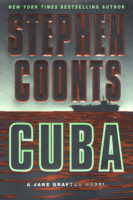
|
I really liked the two CIA spies in the story, Carmellini and Chance. Those guys were great. Will we be seeing Carmellini again in future stories?
Yes, he's going to be in the next book. I like the idea of the burglar, the guy with the somewhat nefarious background. As Jake tells him in the next one, he says "you've got lots of smirches." The character is besmirched.
What was the most challenging aspect of writing Cuba for you?
I guess it was getting the Latin culture right and getting the flavor of Cuba. I wanted to go down there, but my wife didn't want me to go. She thought somebody in Cuba might have read Under Siege, and that I should just stay home in the United States. So that was tough. Luckily, my next door neighbor happens to be Puerto Rican and she's very much into the whole Latin culture. She read different versions of the manuscript on three or four occasions, and helped me capture the flavor of the Latin culture. We looked at pictures and books and maps of Havana and Cuba, but I'm sure some of the descriptions are wrong. I got an email the other day from somebody who wanted to tell me that one of the hotels wasn't quite the way I described it. What could I say? (laughs). You just sit there and think, "Oh my God, he read the whole book and that's all he's got to talk about?"
I though it was really interesting the way you wove the saga of the Cuban family, the Sedanos, into the little bit more familiar, action-oriented Jake Grafton storyline. Was it difficult to integrate the family story into the action parts of the novel?
Well, not really. I just don't think the public is all that interested now in so-called straight military action adventure stories, like The Red Horseman, Under Siege, Final Flight or the Minotaur. I think that I was trying to get away from that. To me the best way to talk about Cuba after Castro is to try to capture a little bit of the Cuban experience in the 20th century through the lives of some people. Although the people I picked may not be typical, their story certainly allows the reader to see some of the forces at work in the Cuban society. I just didn't think it would work if it was Jake Grafton and the boys shooting up Cuba, and I didn't want to write it if that's all the book was going to be. We wanted something with much broader scope than that.
Cuba definitely has some very strong, very well-written female characters, such as the pilot Rita, who has appeared in your books before. How did you originally create her character?
Well, Rita was easily because she appeared in about three or four novels and the idea originally was to create a strong female action adventure character that we could use in these stories. I think these stories don't work, if they are all male. So many women read these stories; they won't read them if all the characters are men. More and more women are reading action adventure. I guess they just got tired of Danielle Steele, so now they're into stuff like my books. You have to give them some characters that are interesting to read about. So I have Rita and Mercedes. They're strong women. I think there are plenty of strong women in this world. I married one of them -- and she's no shrinking violet!
It seems like it would be difficult writing a series character like Jake Grafton, keeping him fresh and evolving as a person. Is that ever a challenge for you?
Yes, it is. I got sort of tired of Jake during Fortunes of War, which is a novel that he didn't even appear in. That is the book preceding Cuba. I have always said that I'll put Jake in a book, if I've got a role for him. In Fortunes of War he just didn't fit. I thought it was just fine to leave him out. The fans, however, seem to take a different view of the whole thing. They want to read Jake Grafton stories and they make it known to me. They also make it known at the bookstore too! Jake Grafton stories seem to sell better. I think a writer that doesn't give his fans what they want to read is taking severe risks with his own career. I think you owe it to the fans to give them what they want. It's all just entertainment. I'm not in the running for the Pulitzer Prize. I don't write literature; I just write entertainment, commercial fiction. It's a proud profession and I'm quite happy with that, but I think I've got to give the public what they want, or else I won't be in this business very long.
The V-22 Osprey is featured prominently in this book. How did you get familiar with the operating system and the specs for the aircraft in order to write those action scenes so they're really believable?
 Well, luckily they were doing testing for pre-production
on Ospreys down at NAS Pax River in Maryland.
I called down there, talked to various people
and wrangled an invitation for Deborah and I to fly
a simulator. Obviously everyone and his brother tried to get
an invitation to fly the simulator, but we got in because I'm a
known writer and they were after some good publicity,
which I think the book gave them. So it was sort of quid pro
quo. They knew that I would write a story and I would treat
them decently. I wouldn't make them Nazis or something.
Well, luckily they were doing testing for pre-production
on Ospreys down at NAS Pax River in Maryland.
I called down there, talked to various people
and wrangled an invitation for Deborah and I to fly
a simulator. Obviously everyone and his brother tried to get
an invitation to fly the simulator, but we got in because I'm a
known writer and they were after some good publicity,
which I think the book gave them. So it was sort of quid pro
quo. They knew that I would write a story and I would treat
them decently. I wouldn't make them Nazis or something.
What is the simulator like?
Well, the simulator is actually a lot of fun. You get to see what it's like to fly the airplane. It's a cockpit, like many of the other simulators I've been in. It's not a full motion simulator, but it gives a certain feel for how the airplane is going to fly and its performance capability. You get to take off and hover. It shows you what the airplane will do and how it's going to work. So it's a lot of fun to fly. I only crashed it two or three times. I had a great time.
I'd like to talk about the actual craft of writing. When you start a new book, how do you approach the plot? Do you use outlines?
No, I don't use outlines, and there are days where I sort of wonder if I'm on the right track. Basically, Cuba came about the same
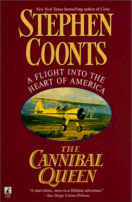
|
I think it was Elmore Leonard who said he tries to write books which leave out all the parts that people normally skip.
I hadn't thought of that -- but that's exactly true. All the fluff, well not so much fluff, but all the stage directions and that kind of stuff that you don't want to read about should just be deleted.
You write in a really tough genre, I think, because you have this mix of a very high-tech background which does have a lot of facts in it (even if you simplify it for the reader), and you've got to integrate that with interesting and complex characters.
Well, it sure keeps me jumping up and down! We're always
| "I think that the Internet is going to revolutionize the way businesses work, the way people communicate and it's going to do it ways that we haven't even dreamed of, because it's just like the telephone system in 1880. Who would have believed what the telephone system has become?" |
Obviously, we're not working from a big outline. We don't have files on how we are going to put this all together. It's all in my head. I'm just carrying it around. So as I write it, I give it to my wife and she reads it and she offers her two cents. She's really good on plots and has great ideas. So then I pick and choose, and incorporate some of her ideas until I think I've got something that works. Then Charlie, my editor, reads it and we get his opinion. Obviously, I'm the guy that gets to put all the opinions together and what you get is my take on the best way to go -- how all these inputs make the best story. But it's certainly not just Steve Coonts sitting in a closet pounding on the keyboard. In addition to the storytelling input, I usually have a bunch of experts on various technical aspects and I give them the manuscript, not in the final form, but in the near final form, and then they offer comments like, "No, the airplane doesn't fly like that," or other technical comments. I always give those people credit. If you look at the books, you'll see an acknowledgement page that thanks all these various people for their input. But the actual craft of putting a story together is me with inputs from Deborah.
Take us through your typical working day.
Deborah and I get up, we go get a bagel, come home and I get up here in my office and start working. I used to have an office I shared with another guy, but then when I married Debra about five years ago, we kept it for another year but then we moved back East here in 1996. Now I have an office here above the garage. I come up here and pound on the computer, play solitaire when the ideas dry up, think about how it's going to go and just keep working.
Do you set a certain number of pages for you to get through a day or a week?
Basically I stop when I run out of day. If during the day the story is going well, I'll do as many pages as possible. I've done as many as 35 pages in a day, but some days I do two. I shoot for ten. If I've done ten, then I feel like it's been a good day. The stories are hard to get started, but the closer I get to the end the more output I have. Because then all the possibilities have been foreclosed by the choices you've already made. The characters are established, the plot is pretty well concrete and see you where you have to go with the story. So then it's just a matter of writing it. At the start of the story, the first 200 pages or so, when you've got all these choices and you're trying to figure out which to pick, then it goes slowly -- especially when you're writing something and then you decide you don't like and you throw that ten pages away and then do it a different way. But finally as you're getting toward the end, when you've got 400 or 500 pages of manuscript, the last several pages just write themselves.
Have you ever faced the dreaded writer's block?
All the time!
How do you deal with it?
It helps for me to come up and turn on the computer and if I can't figure out what happens next in the story, to go back and work on a previous portion. There are always previous portions that need work, that need to be cleaned up and sharpened up. Then you go back to the beginning and go forward again. It seems like I spend more time on the back end of the story then I do on the front end writing forward, but I guess I eventually finish the thing. The idea is that when I write the last page, I've got the whole story pretty much the way I want it so I don't go back again and have to change it.
So it's almost more like a constant revision process as you go?
I'm revising constantly as I go. Because then I've got 100, 200, 300 pages to give to Debra and so they start at the beginning again to see how the story is growing and going. It's not like you've got a bunch of chapters that don't hang together because you didn't have a good idea all the way through.
Have you ever had the desire to write outside your genre?
I've got two books outside the genre, but the publishers haven't chose to publish them in my name. I'm in negotiations right now. They may be published under a pseudonym. I don't just write action adventure. One of them is sort of science fiction, but not really. The other is commercial fiction. There are a lot of characters; it's sort of a love story.
That's interesting. I can see how, given today's publishing climate, publishers would be a bit wary when you step out of your established genre.
You don't want to screw up your brand, your name. Your fans buy books because they think they know what they're getting. So if these books are published, they'll probably come out under a pseudonym.
What is your advice to aspiring novelists?
Some days I think I'm full of good advice and other days I don't
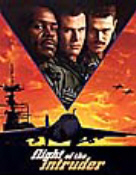 think I have any! I think that if you want to write, don't write to make
money. Write for the fun of it; write to create something. If it sells,
fine; if it doesn't, you won't be grossly disappointed. Read; you've
got to read. Most beginning authors have no idea the amount of craft
that's involved in putting together a story. They think it will just write
itself, that they can just sit there and tap it out. Well, you
could try that, but every
word you choose involves choices and craft. Craft and storytelling
are the whole ballgame; it's why they pay you. I think those skills
have to be acquired,
and the way to acquire is to sit down in front of the PC and just
practice, practice, practice and write, write, write. You'll turn out a
lot of drivel, but if you keep practicing and keep trying to get better
and comparing your stuff you believe to be good to other stuff
(usually to published authors you like and who you know sell
a lot of books), sooner or later
you'll pick it up. It also helps to have people, unbiased readers,
who will read your work and give you honest input.
So many beginning writers think their stuff is good, but
they don't have the craft. Their
characters are stilted, the action doesn't hang together and
they just can't make it read like it has to read before it is going
to sell. They have great stories buried in there, but they don't
have the craft yet.
think I have any! I think that if you want to write, don't write to make
money. Write for the fun of it; write to create something. If it sells,
fine; if it doesn't, you won't be grossly disappointed. Read; you've
got to read. Most beginning authors have no idea the amount of craft
that's involved in putting together a story. They think it will just write
itself, that they can just sit there and tap it out. Well, you
could try that, but every
word you choose involves choices and craft. Craft and storytelling
are the whole ballgame; it's why they pay you. I think those skills
have to be acquired,
and the way to acquire is to sit down in front of the PC and just
practice, practice, practice and write, write, write. You'll turn out a
lot of drivel, but if you keep practicing and keep trying to get better
and comparing your stuff you believe to be good to other stuff
(usually to published authors you like and who you know sell
a lot of books), sooner or later
you'll pick it up. It also helps to have people, unbiased readers,
who will read your work and give you honest input.
So many beginning writers think their stuff is good, but
they don't have the craft. Their
characters are stilted, the action doesn't hang together and
they just can't make it read like it has to read before it is going
to sell. They have great stories buried in there, but they don't
have the craft yet.
Let's talk about the Internet and the electronic revolution. How much do you use the computer and the Internet?
Very little, actually. I obviously get email and do the website thing and there is a message board on the website. That's just about it.
No ecommerce? You're not shopping online for Christmas?
No, I'm not much of an eshopper, except for Amazon.com. In fact, we wouldn't have a website
| "An adult who brings a child into the world is responsible for raising that child. That means supervision. Without adequate supervision and intervention by parents and teachers, you get frightening results." |
The investors will demand it, at some point.
At some point you hope that they will. But still I think it's far too early to look at the Internet and just think, "Ha, there is no way to make a profit on this." I think that the Internet is going to revolutionize the way businesses work, the way people communicate and it's going to do it in ways that we haven't even dreamed of, because it's just like the telephone system in 1880. Who would have believed what the telephone system has become? The fact that so many book lovers are online was the reason we got interested and put the website up. There's no way to tell if it's really helping, if it's selling extra books; there's no way to measure if your marginal sales increase. On the other hand, we sense that it helps and we think we get a lot more reader responses than we used to. I think it's becoming part of the landscape that everybody expects, so in that regard it's going to stay, regardless.
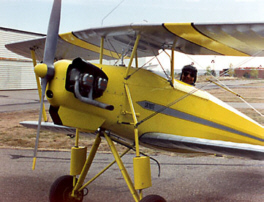 Why don't we talk a
little bit about flying. What do you love most about
flying, if you have to sum it up?
Why don't we talk a
little bit about flying. What do you love most about
flying, if you have to sum it up?
I enjoy the wonder of it. I enjoy getting out and just motoring around. To me it's a great escape. It's a wonderful getaway from the working day world that just about everybody is involved in. For me that's what it is. It's sport recreation more than anything else. I like it. I really like it a lot.
What planes do you own right now?
We have four right now: a Breezy, a 1964 Bonanza, a 1946 J-3 Cub, and a Husky with amphibious floats.
Have you learned to fly the seaplane yet?
I've landed it on the ground, but I don't have a seaplane rating yet. My wife, Deb, does, and when I get this current book finished in the Spring, hopefully she'll teach me how to fly it with some aplomb, and then we'll find an FAA examiner to get me certified. Hopefully, I won't scare him too much!
Previously, you have mentioned some concerns you have about the government regulation of private flight. Is that still a concern of yours?
Yes. We will have a problem as long as the government
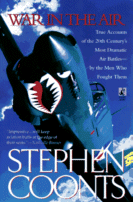
|
For example, we sit here with one of the biggest, nicest bays in the world for flying a seaplane: Chesapeake Bay. And we've got all this boating activity, cigarette boats and speed boats and all these other really loud boats. But if you put a seaplane in the middle of the Bay, people are on the phone to the Maryland Department of Aviation and jumping up and down screaming. Then they find out that it's perfectly legal to fly a seaplane, but that doesn't stop them. They're jumping up and down, bitching and filing noise complaints and everything else trying to get the airplane shoved off the map because it's not a boat. So we've got way too many regulations and too many horses butts out here that think that their little corner of suburbia ought to be some wilderness experience. At some point you wonder whether your kids and grandkids are going to be able to enjoy aviation the way you enjoy it. Aviation is a part of our history, but it's becoming an uninsurable luxury. So at some point I think anybody who looks at it rationally has to say that our country doesn't really care about whether aviation continues. The general public just doesn't give a damn. If they replaced all the small airports with shopping malls, the general public wouldn't care a bit.
Do you miss anything about the practice of law?
I really didn't like it. I didn't like having clients. It was hard taking all of their problems and then being responsible for solving them. I had a general practice for a year and a half, and did corporate law for 5½ years after that. I didn't like the deadlines, and I really didn't like representing people in criminal and civil lawsuits. Not to mention timesheets. I like writing stories much better!
You are known for your skill in writing action scenes. But air warfare has changed a great deal in the last few years from the Golden Age of the fighter pilot, which would be the Korean War, when pilots could actually see who they were shooting at. Now, an F-16 pilot can fire his missile at a target which is 30 miles away -- which isn't all that exciting to read about. How do you get around this issue when you write your action scenes?
The last book that I wrote that had a lot of air battles
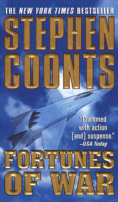
|
In Cuba, we have the hotshot Cuban pilot, Carlos Corrado to provide some excitement in the flying scenes.
Yes, and Carlos does his thing. Those sequences are fairly traditional. They are not too high-tech. In fact, in one sequence, the rules of engagement prevent the Americans from engaging him at max range and shooting him down. So he survives by staying down low, and keeping his radar off, so he's not radiating on the right frequency. He's down among the friendlies, so the pilot that's hunting him can't get permission to shoot from the commander; suddenly this is the only reason he's staying alive. This is the type of guy that can be a threat by using the friendlies to stay alive, and negating all the long-range weapons that our country has spent billions of dollars acquiring.
What was your reaction to the bombing of Kosovo? Do you see any parallels between the way that campaign came about politically and the Vietnam War?
Yes, I did. It looked like a fly-by shooting to me, and that all the Vietnam mistakes were repeated. Obviously, Bill Clinton thought he knew what he was doing -- and so did Lyndon Johnson. I think that Clinton knew going in that he was making about a ten year commitment to Kosovo. He lied to the American public about that, just like he lied to them about his girlfriend. No sane man could sit there in the White House and really think he was only making a 6 month or one year commitment. This is going to drag on a minimum of 10 years, maybe even 20. We're there until we finally get sick of it, declare victory and go home, leaving these people to kill each other. When you refuse to actually declare war, use ground troops and actually kick some butt, you manufacture all these problems for yourself. The only way to get the American public to go along with it is to lie to them. This is not sound public policy, in my humble opinion.
As a father, what is your opinion on the outbreak of all the teen violence? Is the media (films, TV and video games) partly responsible for promoting violent attitudes and behavior?
I don't think that those things have a bad effect on healthy teenagers. Healthy teenagers can watch horror movies and play video games and be unaffected. They understand the difference between fantasy and reality. But the kids that have so little going for them in their lives and have a bad family life (and so many kids are in this situation) are a different story. Children who have been abandoned by one or both parents are very susceptible. For example, the two boys responsible for the Littleton, Colorado shooting at Columbine were making bombs in their basement and the parents claimed they had no idea what was going on. What kind of parents could they be? Believe me, if my kids were making 30 bombs in my basement, I'd know about it. I don't think these people are paying proper attention to their children, and so there are a lot of dysfunctional, non-functional families. Many of the public agencies who are supposed to be helping are also ineffective. These kids have serious problems, but many people are afraid to intervene for fear of being sued themselves. So you end up having a bunch of kids who are, in effect, real little animals. They prey on their fellow students and on the general public. Some of the things they do are just horrible.
So, what's the answer?
An adult who brings a child into the world is responsible for raising that child. That means supervision. Without adequate supervision and intervention by parents and teachers, you get frightening results. The shooters in the Columbine case were suicidal, homicidal maniacs. They were insane, by any definition you could pick. I think that there is a lot of bullying that goes on in these big, impersonal schools, and it's unfortunate that it doesn't get stopped by the teachers and the principal who are fearful of being sued if they intervene. Some of these kids' lives are turned into living hell by peer pressure, bullying, constant teasing and harassment. Add the lack of attention by parents and teachers, and the kid ends up feeling so mistreated that he buys a gun and gets revenge (in his mind). He may even think it's self-defense. Some of the violence is probably a scream for help in disguise. It's a real tragedy that we must address as a country.
What would you like for Christmas this year?
I haven't given it a whole lot of thought. I like to shoot. Mostly I just shoot at targets, though. So that's probably what I'd like for Christmas: a new rifle. My wife's not fond of guns, but she takes the attitude that boys need their toys. She just kind of rolls her eyes about it.
What are your plans for the Millennium New Year's Eve?
We'll go next door to our neighbor's party, go to bed sober, and wake up without a hangover. That's the plan.
Will you make any New Year's Resolutions?
I never keep them, so I gave up making them years ago!
What is your next book project?
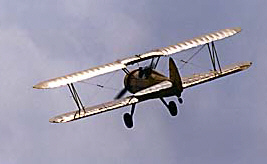 The next book is called Hong Kong, and it will feature
Jake Grafton. The book will be out in August or
September, 2000, depending on how fast I can get the
manuscript finished.
The next book is called Hong Kong, and it will feature
Jake Grafton. The book will be out in August or
September, 2000, depending on how fast I can get the
manuscript finished.
Is there anything else you'd like to say to our readers?
Read books! It's better for you than watching television and it's a lot more fun!
Return to the January 2000 issue of The IWJ.
More from Writers Write
